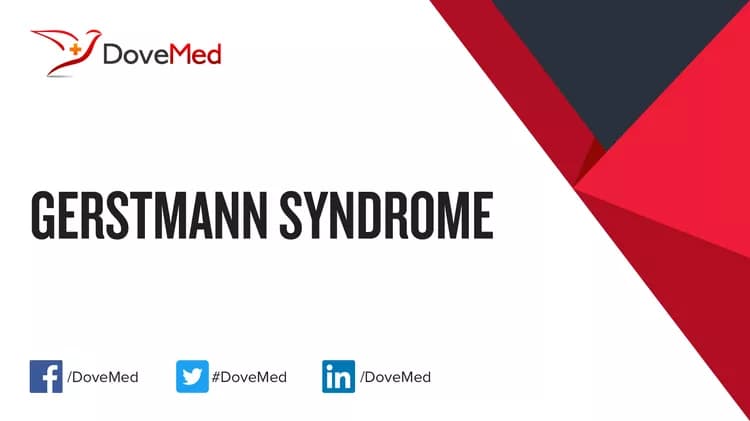What are the other Names for this Condition? (Also known as/Synonyms)
- Developmental Gerstmann Syndrome
- Gerstmann Tetrad
- GS (Gerstmann Syndrome)
What is Gerstmann Syndrome? (Definition/Background Information)
- Gerstmann Syndrome (GS) is a neurological disorder that affects both children and adults. It is primarily recognized by four main factors (factors that aid in its diagnosis too):
- Difficulty in writing
- Difficulty in math
- Difficulty in identifying one’s own fingers
- And, a difficulty in distinguishing between left and right
- Presently, Gerstmann Syndrome is not believed to be a genetic condition. The risk factors include brain injuries, the presence of brain tumors, and an increased risk for stroke
- The causes of Gerstmann Syndrome are often trauma to the parietal lobe of the brain, brain tumors, and stroke; although, the disorder can develop on its own in some children
- The complications of Gerstmann Syndrome may include difficulty performing day-to-day tasks and ongoing neurological damage caused by a tumor or impaired blood flow
- Some of the treatment measures for Gerstmann Syndrome include rehabilitation, surgery, and special education programs. The prognosis is generally good as the symptoms tend to diminish over time
Who gets Gerstmann Syndrome? (Age and Sex Distribution)
- Gerstmann Syndrome is a rare disorder that has been reported in both children and adults
- Males and females both are affected
- Worldwide, all races and ethnic groups can be affected
What are the Risk Factors for Gerstmann Syndrome? (Predisposing Factors)
The risk factors for Gerstmann Syndrome may include:
- Individuals with a brain injury
- Having an increased risk for stroke, primarily due to inactivity and obesity
- Brain tumors
It is important to note that having a risk factor does not mean that one will get the condition. A risk factor increases one’s chances of getting a condition compared to an individual without the risk factors. Some risk factors are more important than others.
Also, not having a risk factor does not mean that an individual will not get the condition. It is always important to discuss the effect of risk factors with your healthcare provider.
What are the Causes of Gerstmann Syndrome? (Etiology)
The cause of Gerstmann Syndrome may include:
- Damage to the left parietal lobe of the brain
- Brain tumor affecting the parietal region
- Impaired blood flow to the brain caused by a stroke
Gerstmann Syndrome is not believed to be passed on genetically - from parents to their offspring.
What are the Signs and Symptoms of Gerstmann Syndrome?
The signs and symptoms of Gerstmann Syndrome often vary from one individual to another. It may include any combination of two, or all of these symptoms:
- Unable to write (dysgraphia or agraphia)
- Extreme difficulty with math (acalculia)
- Inability to identify one’s own or somebody else’s fingers (finger agnosia)
- Unable to distinguish between right and left
Additional symptoms that may be present, but are less common include:
- Difficulty with speech or understanding speech (aphasia)
- Having a hard time reading or spelling
In children, the disorder may manifest as difficulty in the following:
- Spelling
- Performing math calculations
- Distinguishing between left and right
- Passing a finger identification test
- Copying a simple drawing
How is Gerstmann Syndrome Diagnosed?
A diagnosis of Gerstmann Syndrome may include:
- A careful physical examination and thorough review of one’s medical history, especially for any reported brain damage or stroke
- The recognition of at least two out of the following four symptoms in adults
- Unable to write
- Extreme difficulty with math
- Inability to identify one’s own or somebody else’s fingers
- Unable to distinguish between right and left
- Neurological examinations to illuminate the cause of the disorder
- CT and MRI scans of the affected region
- Other investigative tests and procedures, as necessary
Many clinical conditions may have similar signs and symptoms. Your healthcare provider may perform additional tests to rule out other clinical conditions to arrive at a definitive diagnosis.
What are the possible Complications of Gerstmann Syndrome?
Possible complications of Gerstmann Syndrome include:
- Difficulty performing day to day tasks
- Neurological damage caused by tumor or impaired blood flow
- Emotional and mental stress
- Reduced quality of life
- Complications from underlying conditions, if any
How is Gerstmann Syndrome Treated?
The treatment measures for Gerstmann Syndrome may include:
- Rehabilitation and counseling
- Special education programs
- Surgery for cases related to tumors or brain injuries
- Some symptoms may diminish on their own over time; however, symptomatic treatment may be provided
How can Gerstmann Syndrome be Prevented?
The measures that may be taken to reduce one’s risk for Gerstmann Syndrome include:
- Maintaining an active lifestyle, in order to reduce the risk of stroke
- Diagnosing and treating cancers early, especially brain tumors
- Minimizing or avoiding activities that could result in trauma to the head
What is the Prognosis of Gerstmann Syndrome? (Outcomes/Resolutions)
- The prognosis for Gerstmann Syndrome is generally good; although, it may also depend on the severity of the underlying cause
- The neurological symptoms may diminish over time, as the child moves into adulthood
- Adjustments must often be made to overcome deficits in one’s cognitive abilities
Additional and Relevant Useful Information for Gerstmann Syndrome:
Dr. Josef Gerstmann, a neurologist, characterized the condition in 1924, after whom it is named Gerstmann Syndrome.
Related Articles
Test Your Knowledge
Asked by users
Related Centers
Related Specialties
Related Physicians
Related Procedures
Related Resources
Join DoveHubs
and connect with fellow professionals


0 Comments
Please log in to post a comment.